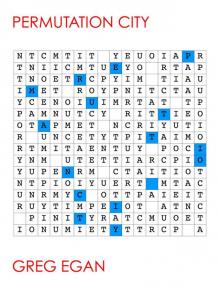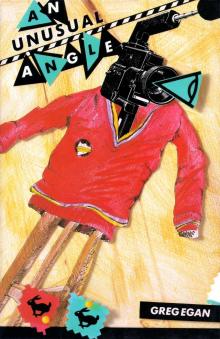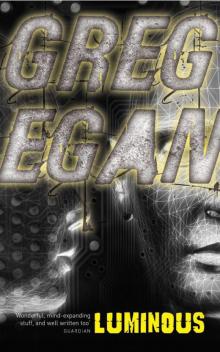Instantiation Read online
Page 3
“I’m all in favor of trolling the transhumanists,” she said, “but there comes a point where it’s just cruel.”
“So what’s the story here?” Dan pressed her, gesturing at the magic formula.
“Until about a year ago, it did seem highly likely that this was a one-way function. But then there was a paper by a group in Delhi proving a nice result in a related subject – which incidentally meant that this function was efficiently invertible. If you pick the output that you want to produce, you can actually find an x and y in quadratic time.”
“Quadratic time?”
“It’s not impractical; an ordinary desktop computer could do it overnight. Someone sat down and wrote a twenty-line program to generate this result, then posted it on the net as a joke. But you’d think everyone would have heard of the Delhi group’s result by now.”
“My friend doesn’t go on the net any more.” Dan couldn’t really explain why Callum hadn’t done some due diligence before adopting that policy, but they were where they were; the question was what to do about it.
“So it would be just as easy to cook up a new x and y that gave the output ‘Relax, you were trolled’?” he asked.
“Yes.”
“And when my friend claims he can verify the calculations with pen and paper, is that actually possible?”
“If he really has that much time on his hands.”
Dan braced himself. “How hard would it be for you to…?”
“Encode the antidote for you?” Dr Lowe sighed. Dan wished he had his Thriftocracy filter between them to boost his sincerity metrics, and maybe add just a hint of puppy-dog eyes.
“I suppose it’s a public duty,” she decided. “In fact, post it on the net, will you? I don’t want to post it myself, because it’s sure to attract a swarm of crackpots and I’ve got better things to do than deal with them.”
“Thank you.”
“I’ll email it to you in a couple of days,” she said. “Or if that’s forbidden, drop by and you can pick it up in person.”
6
“I need to do this,” Janice said, nervously spinning her phone around on the table. The promotional clip she’d showed Dan was still playing, with a smiling nurse helping an elderly patient across a hospital room, while a “colleague” that looked like it had transformed from some kind of elliptical trainer held the patient’s other arm.
“I agree,” he said. “No question. I’ll join the picket line myself.”
She winced. “You can start by not calling it a picket line. We need to make some noise, but this isn’t a blockade.”
“OK. Can I help you egg the Minister’s house afterward?”
“That’s more like it.”
It was almost midnight; Janice had just come back from her late shift. Dan felt his stomach tightening; the union would pay her something from the strike fund, but it wouldn’t be enough to cover the mortgage. And he had nothing to show for four months of job-hunting.
“Have you heard from Callum?” she asked.
“Give it time,” Dan replied. “I suspect he’s double-checking everything.”
“If this works, you’ll be Lidia’s hero for life.”
Dan grunted unappreciatively. “And the opposite to Callum.”
“Why? Once he gets over the embarrassment, he ought to be grateful that you punctured his delusion.”
“Did you ever see The Iceman Cometh?”
Janice said, “I’m too tired to remember, let alone work out what point you’re trying to make.”
“Yeah. We should go to bed.”
Dan lay awake, trying to think of reasons to be optimistic. Maybe the strike would only last a couple of days. Nobody cared whether the sleaze-bags who cold-called them from boiler rooms were human or not, but however many adorable robot seals the hospitals put in their children’s wards, the public wouldn’t stand by and let half their nurses be replaced by props from Z-grade science fiction movies.
#
The Minister rose to address the legislative assembly. “We need to be agile and innovative in our approach to the provision of health care,” she said. “The public expects value for money, and this illegal strike is just a desperate, cynical attempt by special interest groups to resist the inevitable.”
Everyone in the crowd of protesters was gathered around half a dozen phones, standing on tip-toes and peering over people’s shoulders instead of each watching on their own. It was awkward, but it made for an oddly communal experience.
“The independent research commissioned by my department,” the Minister continued, “demonstrates conclusively that not only will we be saving money by rolling out the Care Assistants, we will be saving lives. We will open more beds. We will slash the waiting times for surgery. And we will speed up the throughput in the Emergency Departments. But the unions are intent on feathering their own nests; they have no interest in the public good.”
The jeering from the opposition benches was subdued; that from the nurses around him less so. Dan had read the report the Minister was citing; it was packed with dubious suppositions. There had certainly not been any peer-reviewed trials establishing any of these vaunted claims.
“Get over yourselves and get back to work!” a man in a wheelchair shouted, as he powered his way toward the sliding doors at the hospital’s main entrance. The nurses were maintaining a skeleton staff to ensure that no patients were put at risk, but there was no doubt that people had been inconvenienced – and the CareBots were still far from able to plug all the gaps.
Dan glanced at his watch. “I have to go pick up Carlie,” he told Janice.
“Yeah. See you tonight.” Her voice was hoarse; she’d been here since six in the morning, and the chants weren’t gentle on anyone’s throat.
Dan squeezed her hand as they parted, then made his way slowly through the throng toward the carpark.
Before he could unlock the car, his phone chimed. He glanced at it; he had a message from the bank. He’d applied for a temporary variation on their loan agreement: a two-month period of interest-only payments. They’d turned him down.
The strike wasn’t going to end in the next few days. He sent a message to Janice.
You saw that from the bank? I think we need to move now, or they’ll do it for us and screw us in the process.
He stood by the car, waiting, feeling the blood rising to his face. What good was he to her and their daughter? He’d forced her into a position where she’d had to work every day until she could barely stand up, and now they were still going to lose the house. He should have got down on his knees and begged Graham to find him his own wealthy pervert to titillate. At least he’d never aspired to be any kind of writer, so debasing the practice wouldn’t make him a whore.
The reply came back: OK, do it.
Dan covered his eyes with his forearm for a few seconds, then got control of himself. He had the listing prepared already; he opened the real estate app on his phone and tapped the button that made it go live.
Then he got into the car and headed for the school, rehearsing his speech to Carlie about the amazing new home they’d be living in, with stair-wells covered in multi-colored writing and a balcony so high up that you could see everything for miles.
7
“I was played,” Callum said angrily. He was sitting on the last of the packing crates, drenched with sweat, after helping Dan lug it up eight flights to the Beautiful Place.
Dan was still struggling to catch his breath. His gym membership had expired a month ago, and apparently his cardiovascular system had mistaken the sudden decline in demand for an excuse to go into early retirement.
“You don’t know CPR, do you?”
“You’ll be fine.” Callum cycled, rain or shine, rich or poor, right through the Singularity. “I know you think I was an idiot, but it’s not that simple.”
Dan sat on the floor and put his head on his knees. “Please don’t tell me that it was all a double bluff: our AI masters pretended to re
veal themselves, then allowed you to discover that they really hadn’t, in order to convince you that they don’t exist. Of all the even-numbered bluffs, the less-famous ‘zero bluff’ cancels itself out just as thoroughly, while attracting even less attention.”
But Callum was in no mood to see his faith mocked, and if his Shroud of Turin had failed its carbon dating, that demanded a conspiracy at least as elaborate as his original, theological claims.
“It’s not as if I took that Reddit post at face value,” he said vehemently. “I checked the Wikipedia article on one-way functions before I did anything else. And I swear, the formula was still listed as a high-confidence candidate. There was even a link to some famous complexity theorist saying he’d run naked across a field at MIT if it was ever disproved in his lifetime.”
“Maybe he’d already seen an early draft of the paper; it’s so hard to find good excuses for compulsive exhibitionism.”
“Last week, I went back to Wikipedia and looked at the edit history. That part of the article was actually updated to take account of the Delhi result, months before I read the page.”
“But then some vandal rolled it back?”
“No. Or at least, if that’s what happened, the edit history doesn’t reflect it.”
Dan’s breathing had slowed now; he raised his head. “OK. So the trolls didn’t just edit the article, they had the skills to cover their tracks. That’s sneaky, but—”
“‘Sneaky’ isn’t the word for it! I’ve been comparing notes with people online, and either the article was edited thousands of times in the space of a couple of days – all without raising any flags with Wikipedia – or the edit history is actually correct, but certain people were fed the older version, somehow.”
Dan gazed across the floor at all the crates he needed to unpack before Janice arrived with Carlie. “Someone messed with your head, and you’re angry. I get it. But that doesn’t mean you have a personal cyber-stalker, who knew exactly when you’d taken the bait and jumped in to prop up all the other pieces of fake scenery as you walked by each one of them.”
Callum was silent for a while. Then he said, “The thing is, when we thought it was real, we weren’t doing too badly. We were keeping things together: fixing each other’s stuff, doing food runs out into the countryside.”
“Practicing your Linda Hamilton chin-ups, learning to fire rocket launchers…”
Callum laughed, but then caught himself. “I can think of a few countries where it might have ended up like that.”
Dan said, “So look on the bright side.”
“Which is?”
“You can still play Terminator: Resistance for as long as you like, repairing your analog gadgets and running a clandestine food co-op under the radar of the digital banking system. All without turning into survivalist nut-jobs, or worrying about killer robots trying to assassinate your leaders.”
#
When Janice and Carlie arrived, they were accompanied by Carlie’s friend, Chalice, who’d heard so much from Carlie about the family’s glorious new abode that she’d talked her mother into letting Janice whisk her away for a quick tour.
“Come and see my bedroom!” Carlie demanded. Dan hadn’t even reassembled the shelves there, but the sheer novelty of the place seemed to be enough to keep his daughter enchanted, and if her friend was unimpressed she was polite enough not to show it.
At least the fridge had been running long enough that they had some cold fruit juice to offer their guest when the tour was over.
“Chalice’s mother has her own fashion line, and her own perfumes, just like Japonica,” Carlie explained, as she dabbed a forefinger curiously into the ring of condensation her glass had left on the table.
“Aha.” Dan glanced questioningly at Janice, who returned an expression of pure agnosticism.
“I don’t want that kind of high-pressure lifestyle myself,” Chalice said. “I just want people to be able to look at the pictures of my ordinary day, and see how to stay healthy and stylish on a budget.”
Janice said, “I think it’s time I drove you home.”
Dan went to put up the shelves. When he was done, he toured the flat himself and took stock of things. The place looked even smaller now they’d furnished it, but it was clean, and the rent was reasonable. They’d got out of the mortgage just in time, and managed to land on their feet.
#
When Carlie was in bed, Janice said, “I have some news.”
She was fidgeting with her wedding ring, which was a bad sign; when she was stressed, she got eczema on her fingers.
“We’re going to end the strike. No one can hold out any more.”
“OK.” Dan wasn’t surprised; the tribunal had ruled a week before that the nurses should return to work and re-start negotiations, and the decision had come with a deadline and the threat of fines for non-compliance.
“But the hospital’s already sent out dismissal notices to twenty percent of the workforce.” Janice held up her phone. The message was shorter than Dan’s own conversation with Human Resources.
“I’m sorry.” Dan took her hand. Her job had been ten times harder than his – and though she’d worked in the same ward for the last eight years, they’d never made her position permanent. As a casual employee, she wouldn’t get a cent in severance pay. “At least we’ll have a bit left over from the equity in the house, once the settlement goes through.”
“Enough to keep us afloat for three months?” she asked. That was how long they’d have to wait before they’d be eligible for the JobSearch Allowance.
“It should be.”
“‘Should’?”
Dan was meant to be on top of their finances; it was the one thing he was supposed to be good at. “If we’re careful,” he said. “And if nothing unexpected happens.”
8
Dan parked a hundred meters down the street from Graham’s house, and prepared to wait. For the last three days, he’d managed to spend an hour in the same spot without attracting any attention from the police or local residents, but if he was challenged he was willing to risk claiming that he’d come to visit his friend to discuss a personal matter, only to suffer cold feet. It sounded pathetic, but if the cops knocked on Graham’s door to test the story he was unlikely to flatly deny knowing Dan, and he might well be capable of sincerely believing that Dan could experience both an urge to confide in him, and a degree of reticence when it came to the crunch.
His phone rang; it was his sister Nina.
“How’s Adelaide?” he asked.
“Good. But we’re leaving next week.”
“Really? Going where?”
“Seville.”
“You’re moving to Spain?”
“No,” she replied, amused. “Seville as in Seville Systems – it’s the new town around the solar farm. It’s only about three hundred kilometers away.”
Dan had heard of a big new solar farm about to come online in South Australia, but he’d pictured it in splendid isolation. “Why are you moving to live next to a giant array of mirrors? If they’re going to be selling power to half the country, I’m sure you’ll be able to plug in from Adelaide.”
“The shire did a deal with the operators, and they’re setting up a new kind of community there. Locally grown food, zero carbon housing … it’s going to be fantastic!”
“OK. But what will you do up there?” Nina had trained as a social worker, but as far as Dan knew she hadn’t been able to find a job in years.
“Whatever I want,” she replied. “Part of the deal with the company is a universal basic income for the residents. I’ll have plenty of ways to pass the time, though; I can keep on with my paintings, or I can work with disadvantaged youth.”
“OK.”
“You should come!” Nina urged him. “You and Janice and Carlie … we’d have a great time.”
Dan said, “No, we’re too busy. There are a lot of opportunities we’re looking into here.”
“At least ask Janic
e,” Nina insisted. “Promise me you’ll think about it.”
“I’ve got to go,” Dan said. The courier’s van was pulling up in front of Graham’s house. “Call me when you get there, you can give me an update.”
“All right.”
Graham walked out with a white cardboard box about a meter across, and held it up with the bar-code visible so the van would accept it. A hatch slid open, and he placed the package inside.
When the hatch closed, Graham slapped the side of the van, as if there were a human inside who needed this cue to know that he’d finished. As the van drove off, Dan half expected him to raise a hand in farewell, but he lowered his eyes and turned away.
Dan didn’t risk driving past the house; he circled around the block, catching up with the yellow-and-red van as it approached the arterial road he’d guessed it would be taking, unless this mysterious Medici just happened to live in the same suburb as their Michelangelo. When it turned, heading east, Dan managed to get into the same lane, a couple of cars behind it.
The van maintained its course for ten minutes, twenty minutes, ascending the income gradient. Dan had already spent enough time rehearsing his encounter with Graham’s patron; now he just tried to block the script from his mind so he wouldn’t start second-guessing himself. In the script, he had phrased his request as a business proposition, in language so oblique that even if the whole thing was recorded, half of any jury would refuse to interpret it as blackmail.
He wasn’t proud of himself, but he had to get the family over the line somehow. The government’s computers had convinced themselves that he and Janice had willfully frittered away their savings, so they were facing an increased waiting period for income support. Dan had spent the last six weeks trying to understand the basis for the decision, in the hope of having it reversed, but he had been unable to extract any coherent narrative from the department’s online portal. Apparently some fly-spot in the multidimensional space of all welfare applicants’ financial profiles had ended up correlated with profligacy, and that was that: once you fell into the statistical red zone, no one was obliged to point to any single act you’d committed that was manifestly imprudent.

 Zendegi
Zendegi Permutation City
Permutation City The Eternal Flame
The Eternal Flame Artifacts
Artifacts Wang's Carpets
Wang's Carpets Dichronauts
Dichronauts Incandescence
Incandescence Teranesia
Teranesia Schild's Ladder
Schild's Ladder Quarantine
Quarantine The Four Thousand, the Eight Hundred
The Four Thousand, the Eight Hundred The Clockwork Rocket
The Clockwork Rocket Zeitgeber
Zeitgeber Phoresis
Phoresis The Nearest
The Nearest Diaspora
Diaspora Instantiation
Instantiation Distress
Distress An Unusual Angle
An Unusual Angle Oceanic
Oceanic The Arrows of Time
The Arrows of Time Axiomatic
Axiomatic![Anthology 2. Luminous [1998, 2010] Read online](http://i1.bookreadfree.com/i/03/18/anthology_2_luminous_1998_2010_preview.jpg) Anthology 2. Luminous [1998, 2010]
Anthology 2. Luminous [1998, 2010] Perihelion Summer
Perihelion Summer Luminous
Luminous